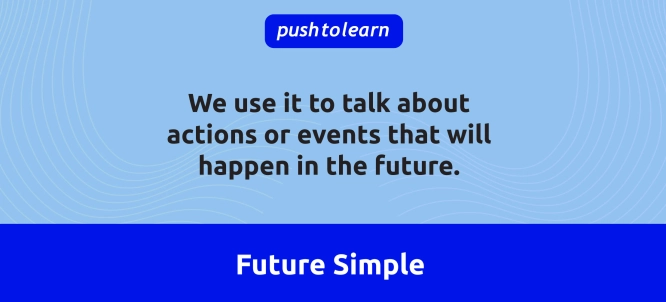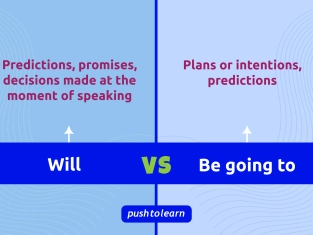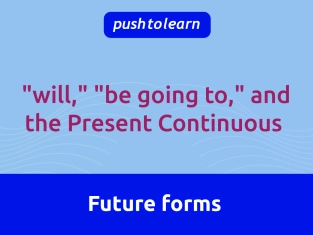by PushtoLearn
Future Simple
Table of Contents
- Future Simple - Exercises and Quiz
- When Do We Use the Future Simple?
- How to Form the Future Simple
- Using "Will" in the Future Simple
- Examples of Future Simple
- When to Use "Will"
- Time Expressions Used with the Future Simple
- Common Errors and How to Fix Them
- Everyday Use of the Future Simple
- Practice Sentences
- FAQ
Future Simple - Exercises and Quiz
These exercises focus on using Future Simple.
When Do We Use the Future Simple?
-
To talk about things that will happen in the future (tomorrow, next week, etc.).
Example: I will go to the park tomorrow.
-
To make promises or offers.
Example: I will help you with your homework.
-
To make predictions about the future (something you think will happen).
Example: It will rain tomorrow.
-
For spontaneous decisions (deciding something at the moment).
Example: I’m hungry. I will eat a sandwich.

How to Form the Future Simple
The Future Simple is formed with:
-
Will +
-
Base form of the verb.
|
Subject |
Example Sentence |
|
I |
I will play soccer. |
|
You |
You will go to school. |
|
He / She / It |
He will visit his friend. |
|
We |
We will watch a movie. |
|
They |
They will call tomorrow. |
Using "Will" in the Future Simple
-
Positive Sentences:
-
Subject + will + base verb.
-
Example: They will travel to Paris next week.
-
Negative Sentences:
-
Subject + will not (or won’t) + base verb.
-
Example: She will not (won’t) come to the party.
-
Short Form (Contraction): Will not = won’t
-
Example: I won’t eat pizza.
-
Questions:
-
Will + subject + base verb?
-
Example: Will you help me with this project?
-
Short Answer: Yes, I will / No, I won’t.
Examples of Future Simple
|
Positive Sentence |
Negative Sentence |
Question |
|
I will call you later. |
I won’t call you later. |
Will I call you later? |
|
She will study tomorrow. |
She won’t study tomorrow. |
Will she study tomorrow? |
|
They will visit next week. |
They won’t visit next week. |
Will they visit next week? |
|
We will have a meeting at 2 PM. |
We won’t have a meeting. |
Will we have a meeting? |
When to Use "Will"
-
Decisions made at the moment:
-
Example: I’m thirsty. I will drink some water.
-
Promises:
-
Example: I will help you with your homework.
-
Predictions about the future:
-
Example: I think it will rain tomorrow.
-
Offers:
-
Example: Don’t worry, I will take you to the airport.
Time Expressions Used with the Future Simple
We often use the Future Simple with time expressions like:
-
Tomorrow: I will see you tomorrow.
-
Next week / month / year: They will travel to Spain next year.
-
In (an hour, a day, a week): We will leave in an hour.
-
Soon: She will call you soon.
Common Errors and How to Fix Them
-
Forgetting to use "will":
-
Incorrect: I go to school tomorrow.
-
Correct: I will go to school tomorrow.
-
Using the wrong verb form:
-
Incorrect: He will goes to the store.
-
Correct: He will go to the store.
-
Confusing "won’t" with "will":
-
Incorrect: I won’t help you. (when you mean you will help)
-
Correct: I will help you.
Everyday Use of the Future Simple
-
I will cook dinner tonight.
-
She will visit her grandmother this weekend.
-
We won’t be late to the meeting.
-
Will you come to the party?
Have a look at the lesson about Will vs Be going to and Future forms for more options to talk about future actions.
Practice Sentences
|
Positive Sentence |
Negative Sentence |
Question |
|
I will study tomorrow. |
I won’t study tomorrow. |
Will I study tomorrow? |
|
They will go to the park. |
They won’t go to the park. |
Will they go to the park? |
|
He will call you later. |
He won’t call you later. |
Will he call you later? |
FAQ
When do I use the Future Simple?
Use the Future Simple to talk about things that will happen in the future, promises, predictions, and decisions made at the moment. Example: "I will go to the store tomorrow."
How do I form the Future Simple?
Use will + the base form of the verb. Example: "She will study tonight."
How do I make a negative sentence?
Add not after will (or use the contraction won’t). Example: "He won’t come to the party."
How do I ask a question in the Future Simple?
Start with will, then add the subject + base form of the verb. Example: "Will you call me tomorrow?"
What’s the difference between "will" and "won’t"?
Will is used for positive sentences, and won’t (will not) is used for negative sentences. Example: "I will help" vs. "I won’t help."

